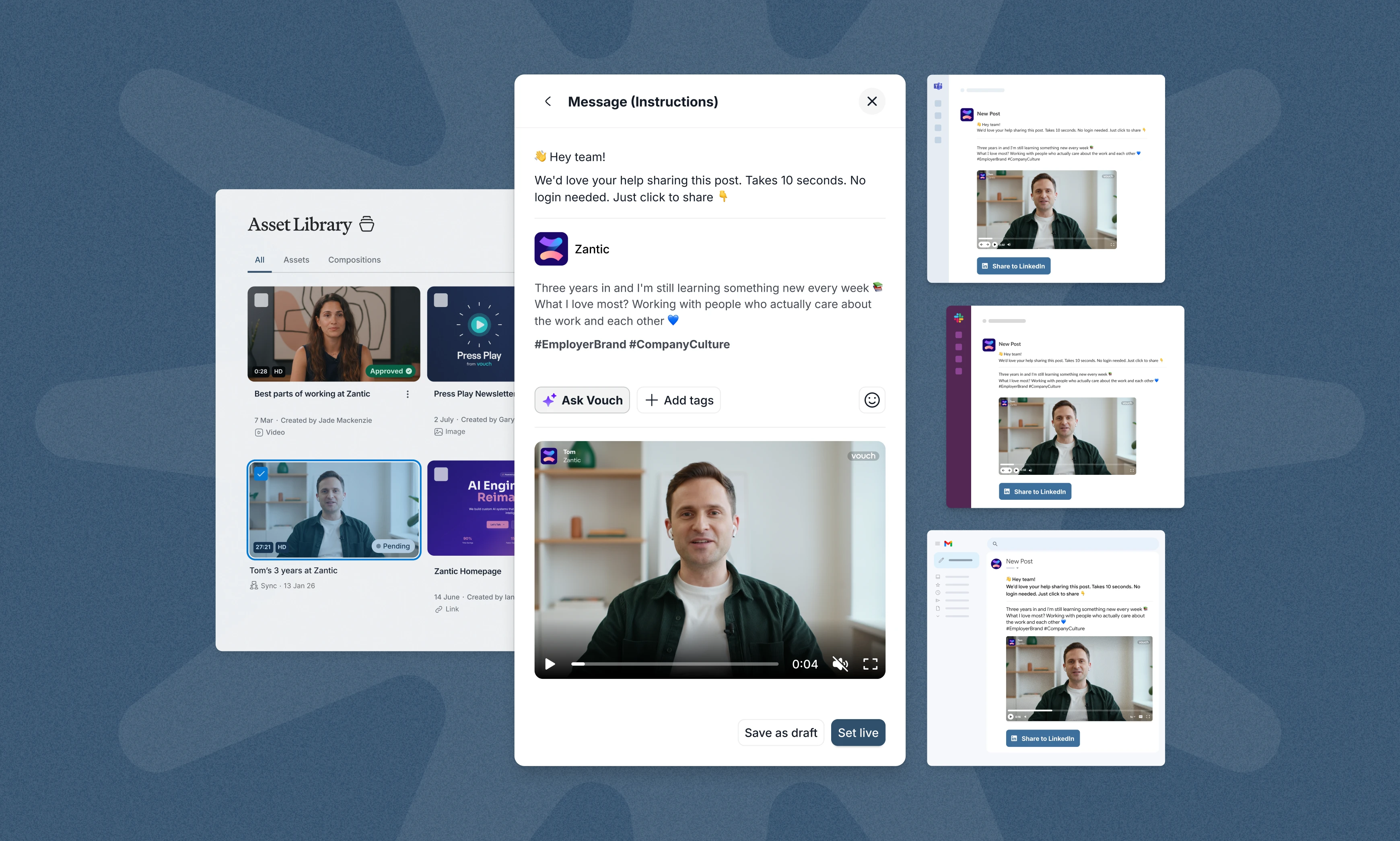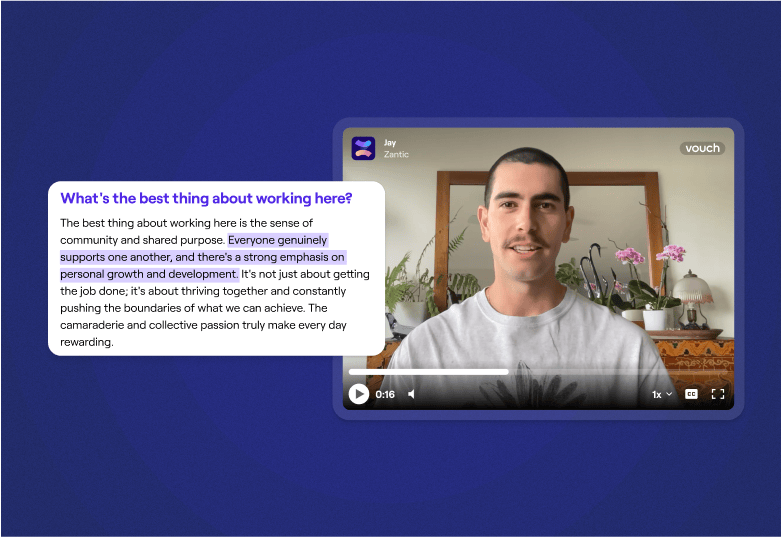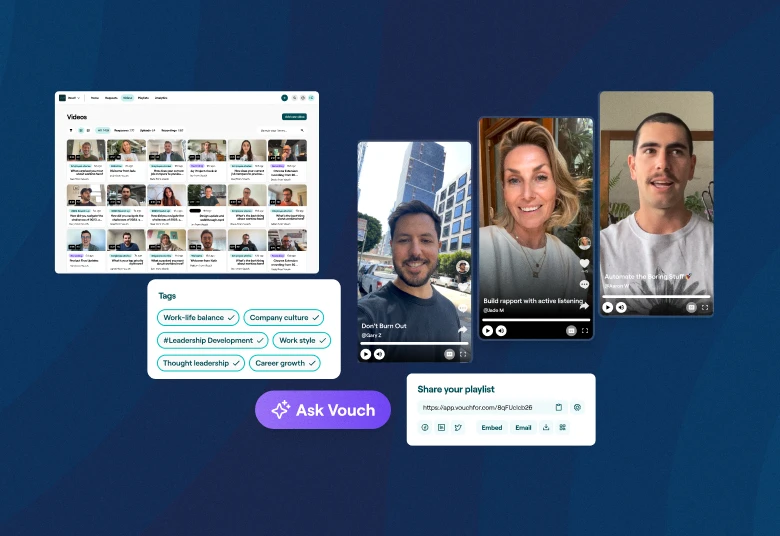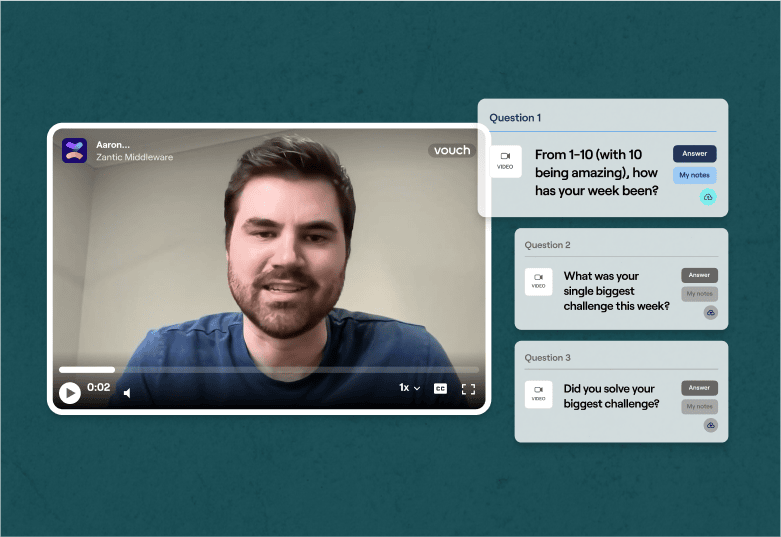No matter what industry you are in, having highly engaged teams is crucial for the success of your company.
Disengaged employees have been a growing problem in the last decade, and with Gen Z entering the workforce, and so, building engaged teams really need to be part of your overall company strategy.
In 2026, tools like Vouch can help significantly in building engaged teams, and we'll get into why soon.
Let's get started with some statistics:
- In 2021, only 15% of employees were truly engaged in their jobs, while 85% were either not engaged or actively disengaged. Source: Gallup's "State of the Global Workplace" report, 2021.
- The cost of employee turnover due to disengagement was estimated to be around 33% of an employee's annual salary. Source: Work Institute's "2021 Retention Report."
- In 2021, it was found that disengaged employees were 73% less likely to recommend their organization as a place to work. Source: Quantum Workplace's "2021 Employee Engagement Trends."
So, with those statistics in mind, let's dive into building highly engaged teams in 2026!
Employee Engagement Definition
Employee engagement is the active involvement and enthusiasm of employees in their work and the workplace.
Employee engagement goes beyond mere job satisfaction and reflects an emotional connection and dedication to their roles and the organization as a whole.
Engaged employees are, by definition, passionate about their work, motivated to excel, and fully committed to achieving their employer's goals.
Workplace culture plays a significant role in employee engagement, where a positive and inclusive culture fosters a sense of belonging, trust, and collaboration, creating an environment where employees feel valued and supported. It encourages open communication, autonomy, and opportunities for growth and development.
Having engaged teams will directly impact your business's revenue, as engaged employees are more productive, innovative, and customer-oriented, which ultimately leads to improved profitability.
Engaged teams and employees take ownership of their responsibilities and actively contribute to the success of your company.
What Are The Benefits of Employee Engagement?
Investing in employee engagement is essential for organizations striving to create a positive and thriving workplace culture.
It requires a strategic approach that involves aligning company values and goals with employee needs and aspirations, providing opportunities for growth and development, and fostering a supportive and inclusive work environment.
The benefits though, are remarkable, and so, let's expand on how you can build highly engaged teams:
1. Promote Empathy Within Your Team
Engaged teams thrive on positive relationships and understanding among team members. When there is empathy and understanding, there is a culture of collaboration, ultimately leading to better team dynamics.
By promoting empathy, your team members can develop a deeper understanding of each other's perspectives, needs, and strengths.
One effective way to promote empathy and understanding is through employee spotlight questions or get-to-know-staff questions that you can share with your team.
These spotlights allow team members to gain valuable insights into their colleagues' personalities and preferences, helping each team member share their views in their own communication style, which helps everyone work together more effectively.
By fostering empathy and understanding within your team, it becomes easier to navigate conflicts, share ideas, and collaborate on projects enhancing overall team performance and productivity.
2. Encourage New Team Challenges
Engaged teams thrive on accepting challenges and pushing the boundaries of what is possible. They see difficult work as an opportunity for growth and development rather than a setback.
By embracing new projects and challenges, engaged teams demonstrate their willingness to take risks and step outside of their comfort zones, often achieving remarkable results.
Risk-taking is an essential trait in problem-solving, as it allows teams to explore alternative solutions and think creatively. With a fearless approach to challenges, teams are more likely to discover innovative ideas and approaches that can propel them towards success together, using everyone's strengths.
Psychological safety is also critical when fostering a culture that encourages the acceptance of each other. When team members feel safe to share their ideas, opinions, and concerns without fear of judgment or retribution, they are more likely to actively engage in problem-solving processes. Team challenges are simply perfect for bringing everyone in your team together.
The AI-enabled workspace for talent teams.
- Unified workspace for talent teams
- Accelerate hiring with AI tools
- Auto-generate polished hiring and employer brand content
- Easily repurpose assets across all channel
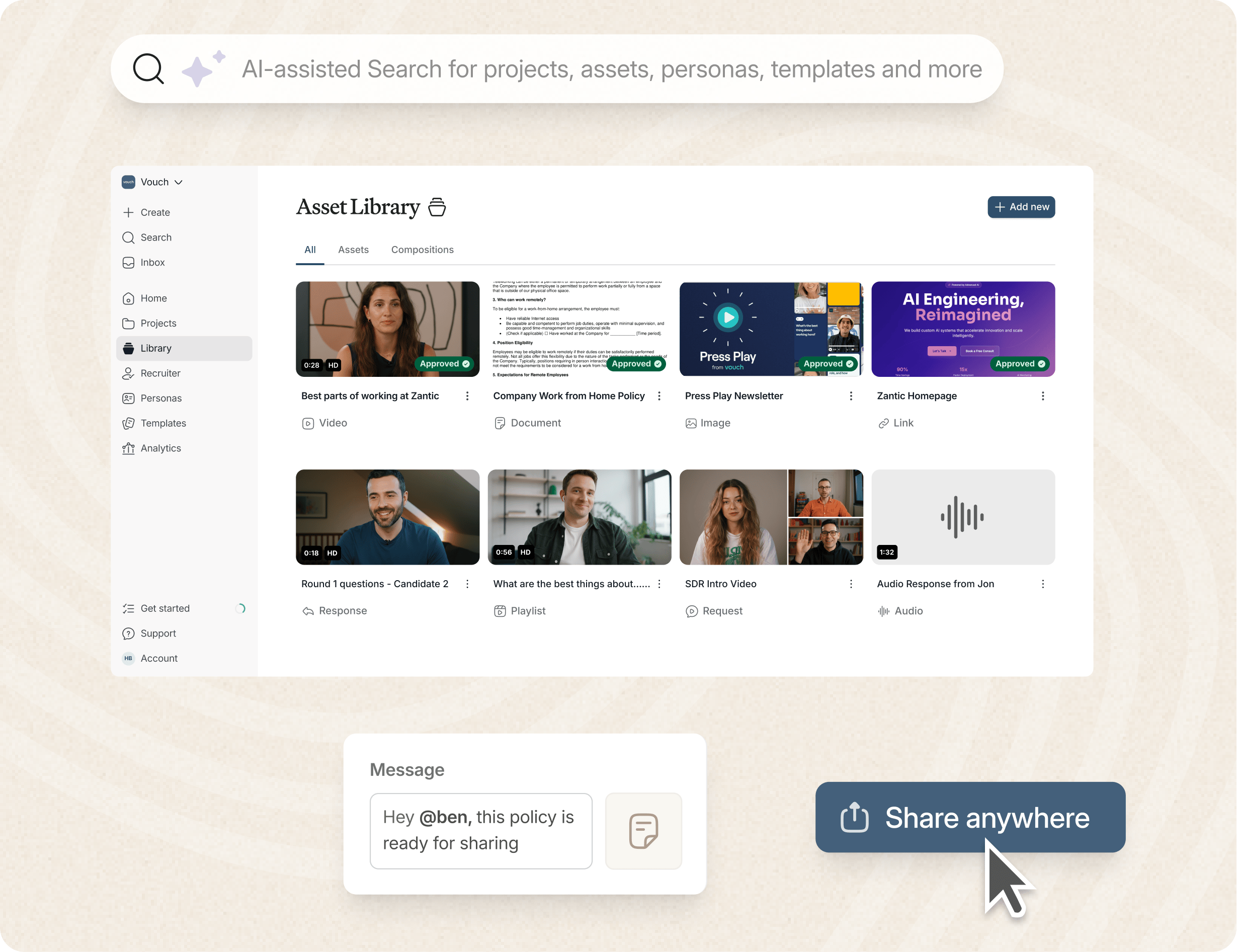
3. Create a Culture of Collaboration
Tailing on to creating new challenges (point 2), collaboration is at the core of highly engaged teams. By actively reaching out to one another, initiating conversations, and working together throughout a project, teams can achieve remarkable results.
However, effective collaboration requires seamless communication and the use of advanced technology, especially in remote work environments.
To facilitate collaboration and connection among team members, it is essential to provide them with the right tools. Video tools like Vouch enable team members to update each other across time zones without either party having to be awake at 3 am or skip dinner with the family to make a call.
Slack channels or other instant messaging applications promote real-time collaboration, allowing team members to share updates, discuss tasks, and seek immediate feedback - and since Vouch integrates with Slack, keeping your team connected is now easier than ever.
4. Embrace The Latest Cloud-Based Technologies
We touched on remote workers in the last point, but even with an entirely in-house team, technology can help significantly with fostering a culture of collaboration and building engaged teams.
Some of our favourite cloud-based tools include Google Drive, where teams can share documents instead of emailing Word docs and hoping for the best. We also love CRMs like Hubspot, design tools like Canva, support tools like Zendesk and more.
With cloud-based software, collaboration becomes remarkably easy as you can un-silo employees from their own computers and into a shared collaborative environment, helping bridge the physical gap and provide feedback efficiently on projects.
5. Set Goals As A Team
Effective goal setting is a vital aspect of engaged teams. When your teams actively participate in setting goals together, it fosters transparency, communication, and a shared understanding of what needs to be achieved. The goals may also be larger too, which is usually great for business.
By involving everyone in the goal-setting process, team members feel a sense of ownership and connection to the larger purpose. This sense of ownership motivates individuals to contribute their best work as they understand how their efforts align with the team's objectives.
Transparency is key when setting team goals, and it's also where modern cloud-based collaboration tools can really help.
6. Lead by Example
Effective leadership plays a crucial role in team engagement. As a manager, it's essential for you to lead by example and demonstrate the qualities you expect from your team members.
By providing feedback, supporting employee wellness, and fostering teamwork, you can create a workplace culture that promotes remarkable engagement and productivity.
A democratic leadership style, where you involve your team in decision-making and empower them to contribute their ideas, tends to create the most engaged teams. This style of leadership not only fosters collaboration but also gives team members a sense of ownership and purpose.
Additionally, building personal connections with your team members helps create a positive work culture where everyone feels valued and motivated, which in turn builds your employer brand and helps you attract top talent to your team, as your current team tells other highly talented people "how good it is to work at your company".
7. Supporting Employee Wellness
A major part of building engaged teams is to make sure everyone in your team is personally happy, healthy and motivated. This is all part of your company's Employee Value Propositions, or EVP for short.
Employee wellness is vital for maintaining engagement and productivity, and by prioritizing the well-being of your team members and promoting work-life balance, encouraging healthy habits, you are on the way to building engaged teams that feel supported and cared for.
Engage Teams And Retention
Investing time and effort into building engaged teams also leads to higher job satisfaction and lower turnover rates.
As a leader, it is crucial to prioritize team engagement in order to see these benefits and build a team that won't leave your company for a competitor. By actively seeking feedback and providing opportunities for team building, even in remote work environments, you can foster a culture of engagement within your organization.
Measuring Your Engaged Teams
Measuring employee engagement is crucial for understanding the level of engagement within a team or organization. By gaining insights into employee engagement, managers can identify areas for improvement and implement strategies to foster a more engaged workforce.
Gallup, a renowned research and consultancy firm, has identified 12 key elements of employee engagement that organizations can utilize as a framework for measurement. These elements help assess various aspects of engagement, including job satisfaction, workplace relationships, and growth opportunities.
One effective method for measuring employee engagement is through ongoing feedback with tools like Vouch. By regularly checking in with team members, you can gauge the level of yor team's job satisfaction, identify areas of concern, and address any issues or challenges that may be hindering engagement.
FAQs
Why is it important to set goals as a team?
Setting goals as a team promotes transparency, communication, and a shared understanding of what needs to be achieved.
By involving everyone in the goal-setting process, team members feel connected to the larger purpose and are more motivated to contribute their best work.
Recognizing and rewarding achievements further reinforces engagement and motivates the team.
How does leadership affect team engagement?
Effective leadership plays a crucial role in team engagement.
Managers need to lead by example, providing feedback, supporting employee wellness, and fostering teamwork. A democratic leadership style, accompanied by personal connections with team members, tends to create the most engaged teams. It is important for managers to undergo leadership training and continually work on improving their leadership approach.
Whose responsibility is it to ensure team engagement?
Team engagement is primarily the responsibility of managers.
They play a critical role in ensuring that employees understand their work, supporting them, and connecting their work to organizational success.
Leaders need to redefine managers' roles, provide training and development, and create evaluation practices that hold managers accountable for engagement and coaching.
How can employee engagement be measured?
Measuring employee engagement is essential to understanding the level of engagement in a team or organization. Through ongoing conversations, performance evaluations, and goal setting, managers can assess and improve employee engagement.
Conclusion
Creating highly engaged teams requires a proactive approach that focuses on promoting empathy, accepting challenges, building remarkable collaboration, setting goals, providing effective leadership, recognizing employee engagement, and measuring and improving engagement.
By implementing these strategies, you can boost team productivity and create a positive workplace culture that leads to long-term company success and employee satisfaction.
Vouch Is Made For Building Team Engagement!
Loved by companies like Canva, Nike, Cisco, HubSpot, Amazon and more, tools like Vouch make leveraging video in your business remarkably easy.
Be sure to book a Vouch demo today and chat with a video content expert.
You might also like

Elevate Your Brand Today With Vouch
Discover how Vouch can accelerate talent acquisition while helping you stay on-brand.

